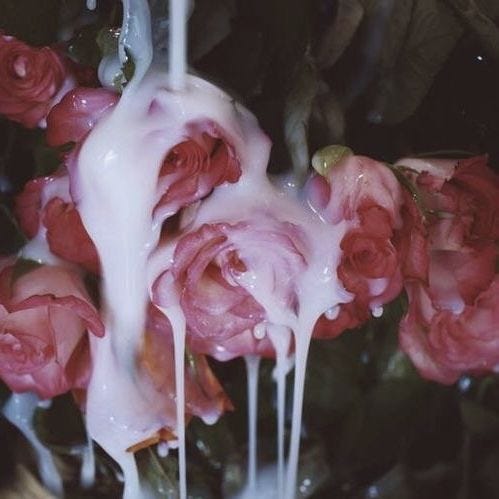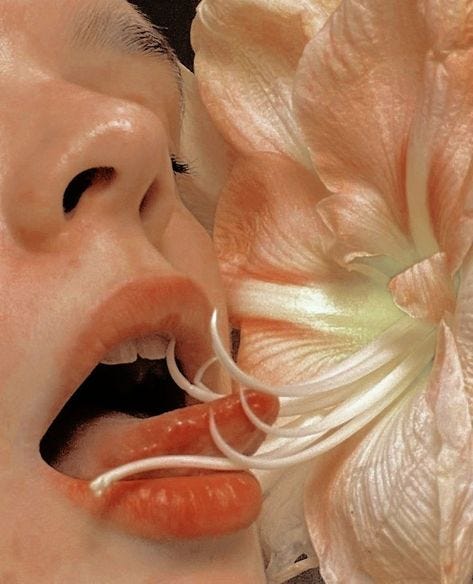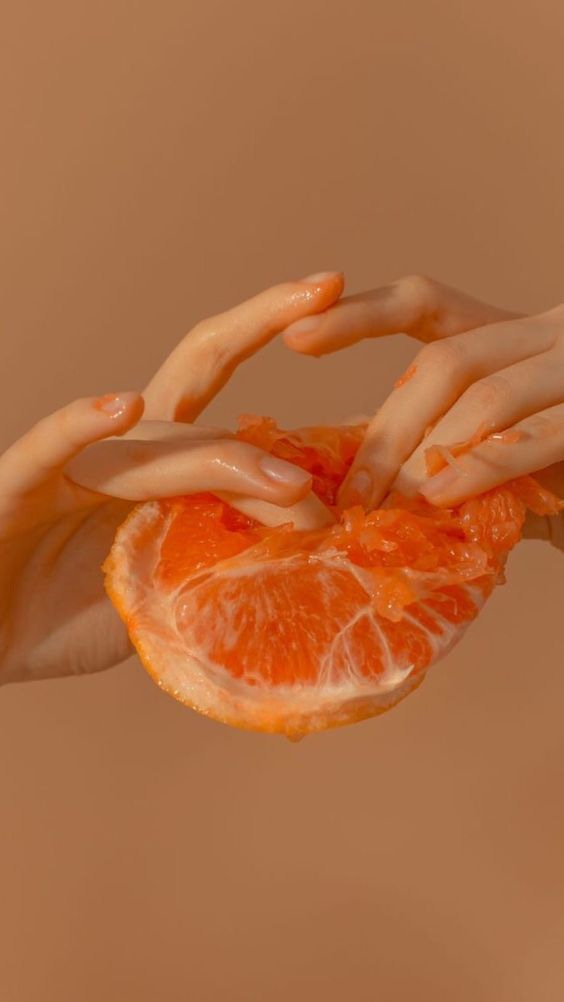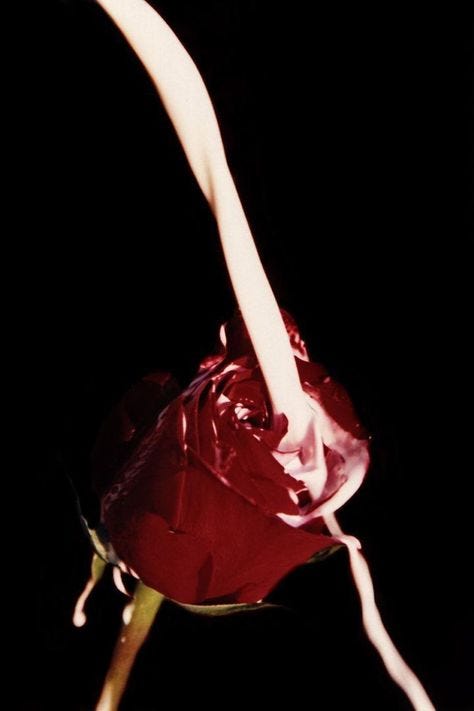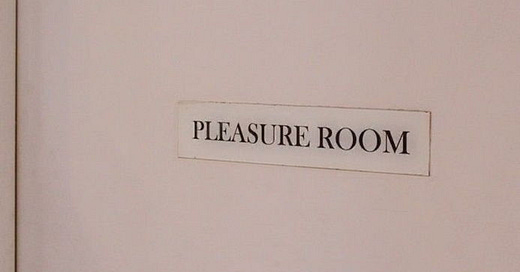Welcome to the Pleasure Room: Pleasure as Practice
What happens when we center pleasure as source ? Am I allowed to feel this good?
Early this spring, I had an experience every reader hungers for, the sensation of consuming something for the first time that you instantly know will stay with you forever. You feel it changing your perspective with every page, an active download, a resonance. It lingers for days or weeks and finds you in the quiet space between thoughts. I had been slowly working through Pleasure Activism by Adrienne Maree Brown and enjoying it, finding nuggets of wisdom and insight. One such nugget was this quote, “...when we begin to live from within outward, in touch with the power of the erotic within ourselves, and allowing that power to inform and illuminate our actions upon the world around us, then we begin to be responsible to ourselves in the deepest sense.” I had already been reflecting on how radical it could be to allow pleasure to lead as a driving force to liberation, and this was the sign I needed to delve deeper.
As much as I enjoyed Pleasure Activism, what it led me to was even more impactful. Brown pays special accolades to Audre Lorde’s essay Uses of the Erotic: The Erotic as Power, and in discovering that work, I found myself feeling seen, heard, and understood in many of the struggles I’ve battled with in my relation to the most sensual parts of myself. Uses of the Erotic felt like a confirmation, a rite of passage, and a permission slip that I didn’t know I was waiting for. It provided the language and validity I needed to tap into the inherent eroticism and inner light I’ve always felt within myself–an energetic force that lies deeply sacred and sheltered; a force I can now admit to being fearful of, as I was never taught to harness it.
Audre Lorde utilizes “the erotic” to describe that inner source that is deeply knowing, powerful, and intimately feminine. The erotic encompasses all the parts of ourselves that are innate, spiritual, and intuitive. It is also the aspect of ourselves that we are most conditioned to minimize, as it is wholly misused and misunderstood on a societal level. We are led to believe that the erotic, and pleasure in general, are solely sexual in their regards. In a culture where anything sexual (especially in the feminine) is taboo and shameful, pleasure falls to the wayside as default. We cast pleasure off as an extravagant, luxurious thing reserved only to be felt in “appropriate” scenarios and utter privacy.
As girls, we are conditioned to believe that our pleasure is dangerous, and expressing it openly is seen as a sign of promiscuity or self-indulgence; these are evidently undesirable attributes that suggest low self-worth. We are encouraged to conceal our pleasure, lest it invite other’s uncontrollable temptation. We infer early on that the most worth our pleasure can attain, is when we hold it close to our budding chests, and share it sparingly. And between this rock and a hard place, it’s easy to conclude that it is safer to keep these things to ourselves, locked behind bitten tongues. More so, it can seem that the best option for our well-being is to remain focused on pleasing those around us, to maintain that sense of security—however false it may be.
There is a belief that a sensual, sexual, erotic, self-liberated woman is somehow less valuable in the heteronormative “market” while a caricatured version of that same woman can be idolized in media for the sake of capital. It becomes clear that pleasure-centered women are only truly deemed worthy in a performative context when created for, and aspiring to, the male gaze. In this dichotomy, we are stuck, perpetually pinballing from one end of the spectrum to the other. Never too much, and also never enough. This is the blaspheme we partake in against the erotic when we simplistically center pleasure around sex. When we use “erotic” to mean “sexualized” we reduce its power as a potential driving force in our lives, whether consciously or unconsciously. The erotic is so much more than sex; it is life’s sustenance, it is courage, it is trajectory, it is liberation.
In Audre’s words, “As women, we have come to distrust that power which rises from our deepest and nonrational knowledge. We have been warned against it all our lives by the male world, which values this depth of feeling enough to keep women around in order to exercise it in the service of men,but which fears this same depth too much to examine the possibilities of it within themselves. So women are maintained at a distant/inferior position to be psychically milked, much the same way ants maintain colonies of aphids to provide a life-giving substance for their masters.” To reclaim the erotic in ourselves is to, finally, push back against that status quo we were born into.
It can be hard to embrace pleasure in its fullness when we are so used to denying ourselves of it; when we have otherwise believed we are unworthy or undeserving of such an existence. Or perhaps we are simply afraid of allowing the sensations to reverberate so deeply that, if we were to lose the source of our pleasure, a gnawing ache would settle in our bones that could never be unfelt. It becomes safer to live within contentment, to allow others to dictate what we are allowed to receive, and in what forms. So we stay with the wanting and stave off the fullness. This is the danger of outsourcing our pleasure.
While I was figuring out the trajectory of this essay I came across this Substack post by Margeaux Feldman, Pleasure, Integration, and Going to Therapy on the Good Days, at just the right time; it resonated with what I’ve been thinking/feeling myself lately. As Margeaux states in her piece: “What my therapist noted at the end of the session was that I’ve really grown in my capacity to stay with pleasure. It doesn’t bring up the same discomfort as it once used to — a discomfort that came from a lifetime of confusing danger with safety, of being taught that my pleasure didn’t matter, of believing that I didn’t deserve good things. Now, things are different. What a gift. If that isn’t something to celebrate, I don’t know what is.” I think this recounting of hers perfectly encapsulates the journey of reconnecting to pleasure. It is scary and it is strange; as all newness is. When we begin to open up to feeling after shutting off the sensation of emotions, it can be an overwhelming experience. Because when we numb ourselves to feeling, it isn’t only the doom and gloom that we turn ourselves off to, it is also joy and vibrancy and sensuality and pleasure–the erotic.
When we have numbed ourselves to our authentic experiencing of pleasure, it can be hard to distinguish what it is that we truly enjoy from the enjoyment we have performed to meet expectations or elicit the “correct response” from those around us (i.e. people-pleasing). When we prioritize being a source of pleasure for others rather than tuning into our inner erotic, we rescind our power. By relinquishing that power to others, we perpetuate our need for external validation. Just as we’ve established that pleasure is more than just sex, self-pleasure is more than just masturbation and indulging in the second slice of cake. Self-pleasure is self-validation. When you are able to give yourself the highest sensations of pleasure, even within the smallest aspects of daily living, you take back that power. It becomes irrevocable, your standards rise, and with them so do your boundaries. With practice, and reclamation, it becomes a more natural state to remain rooted in the erotic and as Margeaux worded it, “stay with pleasure”.
When beginning to practice pleasure-centered living, it is essential to first come to an understanding with the body. We must accept that pleasure goes beyond the physical, but the body is our tool for feeling and expressing it; it allows us to receive signals when things are going right around and within us. This is why practices involving the body are so transformative, especially when rooted in the erotic. Leading with bodily pleasure gives us the opportunity to transmute trauma, shame, and guilt—held deep within our tissues—into profound healing. This is how we liberate ourselves.
A phrase I’ve seen online, which serves as a phenomenal mantra to tap into that inner source, is: “If it’s not a hell yes, it’s a fuck no.” The beauty of pleasure is its intuitive nature; others cannot define it for you or tell you how to experience it physically. Tuning into your body to learn what “hell yes/fuck no” feels like is essential to building the self-trust required to lead with pleasure in all things. Think of your body as a messenger. What is it telling you about where and when you experience the height of enjoyment, bliss, creativity, and passion? How can you follow where it leads you?
This passage from Pleasure Activism was a “hell yes” for me: “This curiosity in my body and my pleasure has helped me to clarify what kind of life work I enjoy and don’t enjoy. Just as obligation is not a great motivator for intimacy and pleasure, I find I can’t live my life doing work that feels like I am obligated to do it because of other people’s expectations. I thrive when the work has elements of pleasure, titillation, total presence. That work might itself appear mundane or tedious to others—it includes housework, exercise, cooking, shoveling my car out of snow, honest conversations, facilitation, family visits. As long as I can see the glimmer of life in it. Sometimes the glimmer is so bright, and I feel utterly alive. I realize that in the present moment I am free, I am a body of sensations and memories and dreams, energies and spirits and ancestors, totally complex and utterly free. Erotic awareness, for me, is coming into an aliveness in your senses that is quite beyond the material world.”
True power is having the ability to find pleasure in all things and owning it fiercely. To claim it and allow yourself to be witnessed in the purest state of erotic living. It is your right to experience pleasure and your duty to yourself to let it permeate the essence of this life. I hope you take a moment to sit in pleasure today; to give yourself that deepest form of self-love. Pause an extra second to deeply smell that first cup of coffee, notice the feel of silk on your skin, nourish your body with sunlight, scrub the tub, take your vitamins, and remember to center pleasure in it all. Let me leave you with this, we can keep it simple: if it feels good to you, it feels good to you–and that, my love, is enough.
